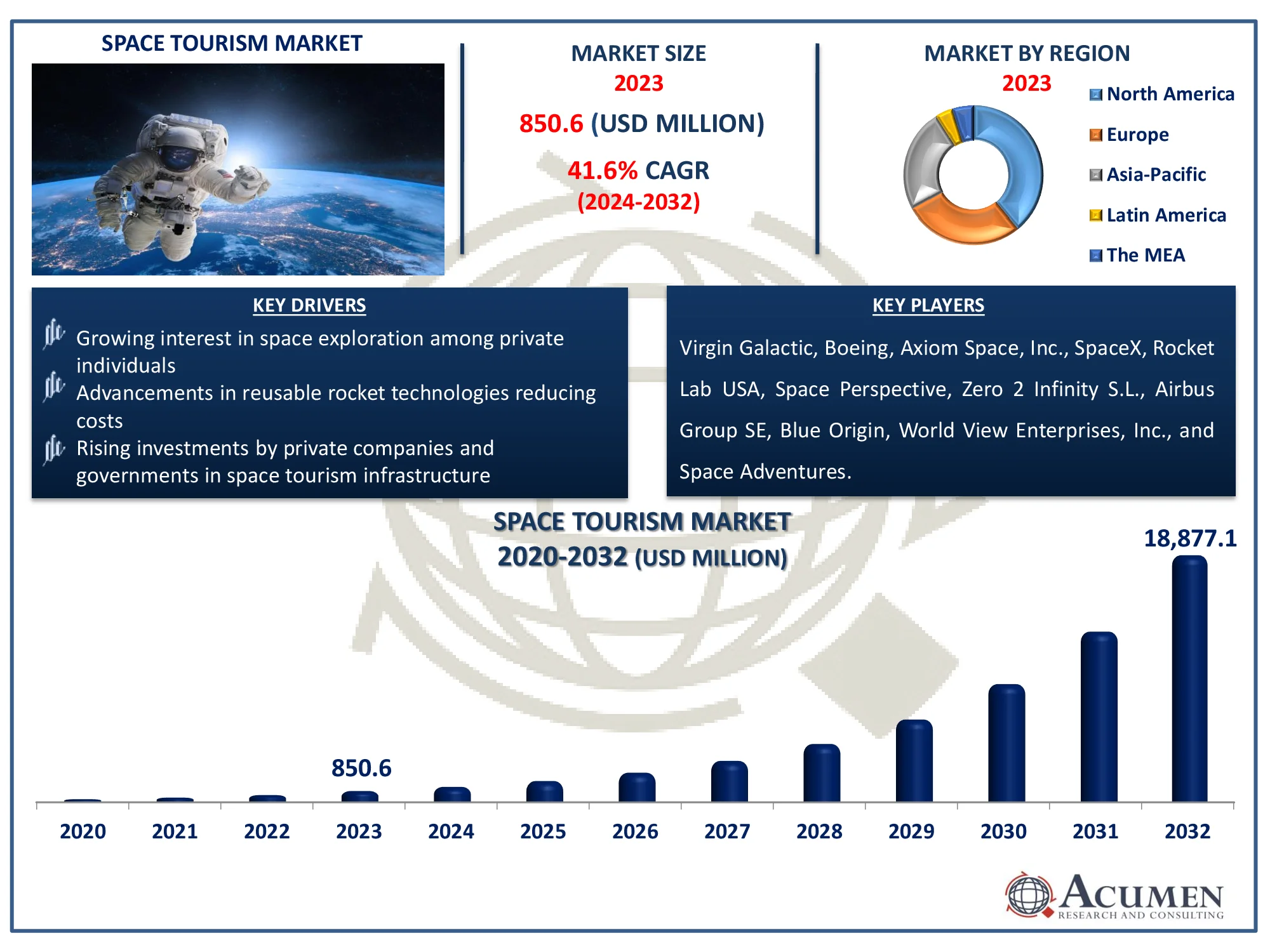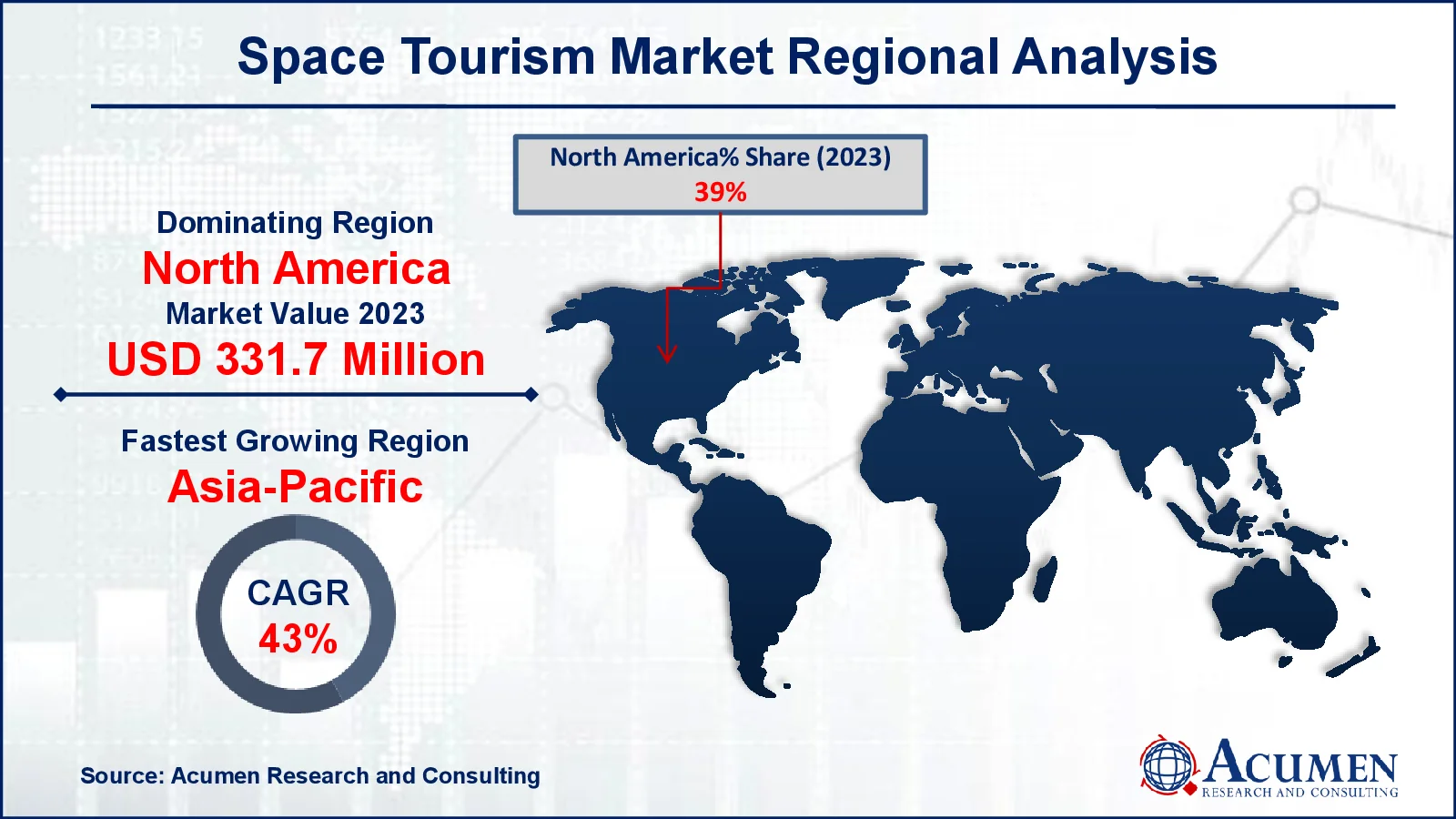Space Tourism Market Size - Global Industry, Share, Analysis, Trends and Forecast 2024 - 2032
Published :
Report ID:
Pages :
Format :
Space Tourism Market Size - Global Industry, Share, Analysis, Trends and Forecast 2024 - 2032
Report Coverage
- Industry Dynamics
- Market Size and Forecast Data
- Segment Analysis
- Competitive Landscape
- Regional Analysis with a Niche Focus on Country-Level Data
- High Level Analysis - Porter's, PESTEL, Value Chain, etc.
- Company Profiles of Key Players
- Option to Customize the Report As Per Your Specific Need
Request Sample Report
The Global Space Tourism Market Size accounted for USD 850.6 Million in 2023 and is estimated to achieve a market size of USD 18,877.1 Million by 2032 growing at a CAGR of 41.6% from 2024 to 2032.
Space Tourism Market Highlights
- Global space tourism market revenue is poised to garner USD 18,877.1 million by 2032 with a CAGR of 41.6% from 2024 to 2032
- North America space tourism market value occupied around USD 331.7 million in 2023
- As per a recent survey, more than 50% of Americans expect space tourism to be routine by 2073
- Asia-Pacific space tourism market growth will record a CAGR of more than 43% from 2024 to 2032
- Based on types, the sub-orbital sub-segment expected to generated 48% market share in 2023
- Based on end use, the commercial sub-segment shows 56% growth in 2023
- Rising interest in space-related experiences among affluent consumers is the space tourism market trend that fuels the industry demand

Space tourism refers to commercial activities that allow private individuals to go into space for recreational, leisure, or experience reasons. It includes orbital, sub-orbital, and even deep-space travel, assisted by aerospace businesses that provide advanced spacecraft and equipment. Space tourism has applications beyond enjoyment, including as scientific study, microgravity technology testing, and raising awareness about space travel.
According to World Economic Forum, several companies, including one founded by Billionaire Robert Bigelow, are developing space stations to generate revenue. These companies aim to provide services such as hosting astronauts, offering space travel experiences to wealthy tourists, and leasing orbital facilities for manufacturing and research. This emerging industry is projected to generate significant revenue over the next decade. Overall, this helps to construct space infrastructure like space hotels and reusable launch systems, which drives innovation in the aerospace industry.
Global Space Tourism Market Dynamics
Market Drivers
- Growing interest in space exploration among private individuals
- Advancements in reusable rocket technologies reducing costs
- Rising investments by private companies and governments in space tourism infrastructure
Market Restraints
- Extremely high costs limiting accessibility to the ultra-wealthy
- Regulatory challenges and strict government policies on space travel
- Safety concerns and potential risks associated with space travel
Market Opportunities
- Development of space hotels and long-term orbital stays
- Increasing collaboration between private companies and space agencies
- Growing interest in sustainable space tourism solutions and eco-friendly technologies
Space Tourism Market Report Coverage
|
Market |
Space Tourism Market |
|
Space Tourism Market Size 2023 |
USD 850.6 Million |
|
Space Tourism Market Forecast 2032 |
USD 18,877.1 Million |
|
Space Tourism Market CAGR During 2024 - 2032 |
41.6% |
|
Space Tourism Market Analysis Period |
2020 - 2032 |
|
Space Tourism Market Base Year |
2023 |
|
Space Tourism Market Forecast Data |
2024 - 2032 |
|
Segments Covered |
By Type, By End Use, and By Geography |
|
Regional Scope |
North America, Europe, Asia-Pacific, Latin America, and Middle East & Africa |
|
Key Companies Profiled |
Virgin Galactic, Boeing, Axiom Space, Inc., SpaceX, Rocket Lab USA, Space Perspective, Zero 2 Infinity S.L., Airbus Group SE, Blue Origin, World View Enterprises, Inc., and Space Adventures. |
|
Report Coverage |
Market Trends, Drivers, Restraints, Competitive Analysis, Player Profiling, Covid-19 Analysis, Regulation Analysis |
Space Tourism Market Insights
The rise of the space tourism business is being driven by rising investments from private companies and governments in the development of advanced space infrastructure. For instance, In July 2023, SpaceX launched private astronaut missions to the International Space Station (ISS) and beyond using Crew Dragon, boosting the space tourism business. By showing the dependability and versatility of their spaceship for transporting private passengers into space, SpaceX hopes to broaden the possibilities for commercial space travel, increasing interest, confidence, and investment in the space tourism business.
The extremely high prices of space tourism make it only accessible to the ultra-wealthy, limiting the market's overall expansion. As a result, the sector fails to attain widespread adoption and requires major price cuts to reach beyond the privileged few. However, the growing need for sustainable space tourism solutions and eco-friendly technologies provides a substantial opportunity for the space travel market to expand. SpaceX's reusable rocket technology, as demonstrated by the Falcon 9 and Falcon Heavy launch vehicles, provides a cost-effective and sustainable method to space travel, opening up new possibilities for commercial space tourism businesses. Companies that create greener technologies can attract environmentally concerned customers while also reducing the ecological impact of space flight.
Furthermore, the development of space hotels, as well as the prospect of long-term orbital stays, has contributed greatly to the rise of the space travel market. For instance, Orion Span, a U.S.-based astronomical travel firm, intends to launch a private commercial space station, the Aurora Space Station, into Low Earth Orbit (LEO) to function as a space hotel for up to six passengers at a time. These advances open up a new frontier for luxury travel, allowing travelers to spend extended periods of time in space. As a result, the space tourism industry is expected to grow substantially in the next years, with more companies joining the market to meet the increasing demand.
Space Tourism Market Segmentation
The worldwide market for space tourism is split based on type, end use, and geography.
Space Tourism Market By Type
- Orbital
- Sub-orbital
- Other
According to the space tourism industry analysis, sub-orbital space tourism dominates the market since it is less expensive and has a shorter duration than orbital flights. Sub-orbital flights include traveling to the edge of space without completing a full orbit, providing a brief but exciting space experience. Companies such as Virgin Galactic and Blue Origin specialize in suborbital tourism, making it more accessible to a broader spectrum of clients. This sort of space travel is still the most popular since it offers a unique experience at a lower cost than orbital or deep space missions.
Space Tourism End Use
- Government
- Commercial
- Others
According to the space tourism market forecast, commercial end users are likely to witness the most growth in industry, owing to rising demand from organizations seeking brand promotion, corporate incentives, and staff rewards. Companies are also investigating space for research and product testing in microgravity. For instance, in June 2023, Virgin Galactic announced the start of commercial space line operations. The first commercial spaceflight, 'Galactic 01', was slated between June 27 and June 30, 2023, with the second commercial spaceflight, 'Galactic 02', set for early August 2023. The corporation planned to conduct monthly spaceflights as part of its commercial activities. As space tourism becomes more accessible, organizations see it as an opportunity to provide unique experiences that will boost their brand image and innovation efforts.
Space Tourism Market Regional Outlook
North America
- U.S.
- Canada
Europe
- U.K.
- Germany
- France
- Spain
- Rest of Europe
Asia-Pacific
- India
- Japan
- China
- Australia
- South Korea
- Rest of Asia-Pacific
Latin America
- Brazil
- Mexico
- Rest of Latin America
The Middle East & Africa
- South Africa
- GCC Countries
- Rest of the Middle East & Africa (ME&A)

Space Tourism Market Regional Analysis
For several reasons, North America dominates the space travel market due to the existence of significant companies such as SpaceX, Blue Origin, and Virgin Galactic, who are pioneering the development of space tourism technologies. For example, in March 2024, Blue Origin showed its Blue Ring spacecraft's operational capabilities during the Defense Innovation Unit's DarkSky-1 mission, confirming flight systems and in-space processing. This public-private partnership intends to improve Blue Ring's multi-orbit access, so advancing the objective of expanded human engagement in space. The mission launched on the upper stage of an unidentified National Security Space Launch provider, the exact moment of which was unknown. Furthermore, a significant percentage of persons interested in space tourism contribute to the market's growth.
Asia-Pacific is expected to see robust growth in the space travel market as countries like China, Japan, and India increase their space-related activities. Growing interest from private companies, along with government initiatives to support space exploration, creates opportunities for space tourism. The Government of India has announced initiatives to enhance domestic capabilities for the future development of space tourism. For example, the Indian Space Research Organization (ISRO) revealed that it has conducted feasibility studies for a sub-orbital space tourism mission. This project is expected to be pursued following the success of the Gaganyaan mission, India's first crewed spaceflight program, scheduled for launch in 2026. These efforts underscore India’s ambition to play a significant role in the growing global space economy. Furthermore, the region’s expanding middle class and increasing wealth also contribute to a rising demand for space travel experiences.
Space Tourism Market Players
Some of the top space tourism companies offered in our report include Virgin Galactic, Boeing, Axiom Space, Inc., SpaceX, Rocket Lab USA, Space Perspective, Zero 2 Infinity S.L., Airbus Group SE, Blue Origin, World View Enterprises, Inc., and Space Adventures.
Space Tourism Market Recent Developments
SpaceX, the American Spaceflight Corporation, has made its Crew Dragon spacecraft available for chartered orbital missions. The inaugural mission, Inspiration4, launched in September 2021, carried four private American citizens into Earth orbit for a three-day journey.
Similarly, Axiom Space, another American spaceflight company, has also utilized Dragon spacecraft for private missions. In April 2022, Axiom's first mission transported one astronaut and three tourists to the International Space Station (ISS), marking a significant milestone in commercial space travel market.
Frequently Asked Questions
How big is the space tourism market?
The space tourism market size was valued at USD 850.6 million in 2023.
What is the CAGR of the global space tourism market from 2024 to 2032?
The CAGR of space tourism is 41.6% during the analysis period of 2024 to 2032.
Which are the key players in the space tourism market?
The key players operating in the global market are including Virgin Galactic, Boeing, Axiom Space, Inc., SpaceX, Rocket Lab USA, Space Perspective, Zero 2 Infinity S.L., Airbus Group SE, Blue Origin, World View Enterprises, Inc., and Space Adventures.
Which region dominated the global space tourism market share?
North America held the dominating position in space tourism industry during the analysis period of 2024 to 2032.
Which region registered fastest CAGR from 2024 to 2032?
Asia-Pacific region exhibited fastest growing CAGR for market of space tourism during the analysis period of 2024 to 2032.
What are the current trends and dynamics in the global space tourism industry?
The current trends and dynamics in the space tourism industry include growing interest in space exploration among private individuals, advancements in reusable rocket technologies reducing costs, and rising investments by private companies and governments in space tourism infrastructure
Which type held the maximum share in 2023?
The sub-orbital expected to hold the maximum share of the space tourism industry.



